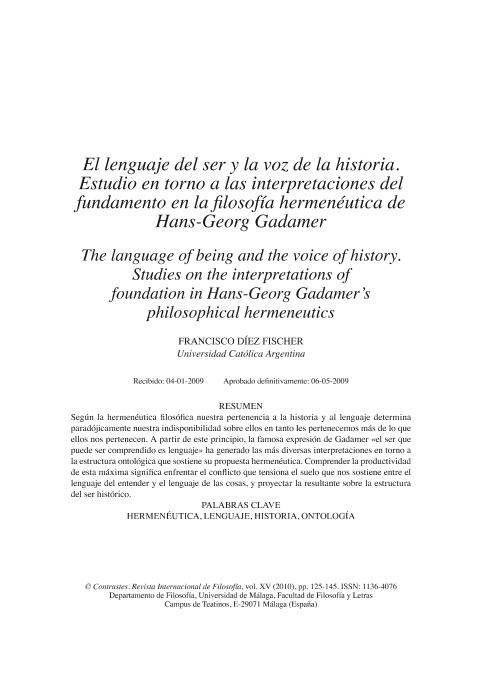Mostrar el registro sencillo del ítem
dc.contributor.author
Díez, Francisco

dc.date.available
2023-03-27T18:55:08Z
dc.date.issued
2009-05
dc.identifier.citation
Díez, Francisco; El lenguaje del ser y la voz de la historia: estudio en torno a las interpretaciones del fundamento en la filosofía hermenéutica de Hans-Georg Gadamer; Universidad de Málaga; Contrastes; 15; 5-2009; 125-145
dc.identifier.issn
1136-4076
dc.identifier.uri
http://hdl.handle.net/11336/191725
dc.description.abstract
Según la hermenéutica filosófica nuestra pertenencia a la historia y al lenguaje determina paradójicamente nuestra indisponibilidad sobre ellos en tanto les pertenecemos más de lo que ellos nos pertenecen. A partir de este principio, la famosa expresión de Gadamer «el ser que puede ser comprendido es lenguaje» ha generado las más diversas interpretaciones en torno a la estructura ontológica que sostiene su propuesta hermenéutica. Comprender la productividad de esta máxima significa enfrentar el conflicto que tensiona el suelo que nos sostiene entre el lenguaje del entender y el lenguaje de las cosas, y proyectar la resultante sobre la estructura del ser histórico.
dc.description.abstract
According to philosophical hermeneutics our belonging to history and language determines our paradoxical unavailability over them as we belong to them more than they belong to us. Based on this principle, Gadamer’s famous expression «being that can be understood is language» has raised the most diverse interpretations about the ontological structure that supports the hermeneutical proposal. Understanding the productivity of this maxim means confronting the conflict that shakes the ground which sustains us between language of understanding and language of things, and projecting the result on the structure of historical being.
dc.format
application/pdf
dc.language.iso
spa
dc.publisher
Universidad de Málaga
dc.rights
info:eu-repo/semantics/openAccess
dc.rights.uri
https://creativecommons.org/licenses/by-nc-sa/2.5/ar/
dc.subject
HERMENÉUTICA
dc.subject
LENGUAJE
dc.subject
HISTORIA
dc.subject
ONTOLOGÍA
dc.subject.classification
Filosofía, Historia y Filosofía de la Ciencia y la Tecnología

dc.subject.classification
Filosofía, Ética y Religión

dc.subject.classification
HUMANIDADES

dc.title
El lenguaje del ser y la voz de la historia: estudio en torno a las interpretaciones del fundamento en la filosofía hermenéutica de Hans-Georg Gadamer
dc.title
The language of being and the voice of history: studies on the interpretations of foundation in Hans-Georg Gadamer’s philosophical hermeneutics
dc.type
info:eu-repo/semantics/article
dc.type
info:ar-repo/semantics/artículo
dc.type
info:eu-repo/semantics/publishedVersion
dc.date.updated
2023-03-23T12:27:31Z
dc.identifier.eissn
2659-921X
dc.journal.volume
15
dc.journal.pagination
125-145
dc.journal.pais
España

dc.journal.ciudad
Malaga
dc.description.fil
Fil: Díez, Francisco. Consejo Nacional de Investigaciones Científicas y Técnicas; Argentina. Pontificia Universidad Católica Argentina "Santa María de los Buenos Aires"; Argentina. Academia Nacional de Ciencias de Buenos Aires. Centro de Estudios Filosóficos "Eugenio Pucciarelli". Sección Fenomenología y Hermenéutica; Argentina
dc.journal.title
Contrastes
dc.relation.alternativeid
info:eu-repo/semantics/altIdentifier/url/https://revistas.uma.es/index.php/contrastes/article/view/1324
dc.relation.alternativeid
info:eu-repo/semantics/altIdentifier/doi/https://doi.org/10.24310/Contrastescontrastes.v15i0.1324
Archivos asociados
